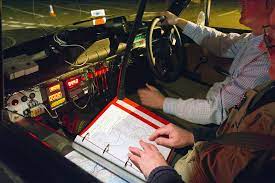
I once had a Welsh friend, the navigator who sat beside the driver in those car rallies where the object seems to be to charge along tracks in the bush, often at night, at terrifying speeds. The navigator’s job was to keep his eyes on the map under torchlight and bark at the driver the instructions in regard to what the road in front was about to do. In other words, he did not look at the road; his only instrument was the map. Therefore, his accurate reading of the map was crucial to survival. Year after year he did this. Then one day, in mid rally, he told the driver to stop. He folded the map, got out of the car and never rallied again. In his case, he had lost his nerve.
In my case, I am writing my 105th blog – 105 being the non-emergency contact number for the police in New Zealand, and “non-emergency” at the head of this piece in Maori. In my case, have I lost the inclination to keep writing? Mine is not writer’s block. I know what “writer’s block” is. I have stopped writing for months while I have wrestled with not being able to see the logical or credible path forward. It is not that I have run out of ideas; it is just that there is a spaghetti junction in my mind, and which strand is the best to follow is not immediately clear.
I always admired Alistair Cooke. I listened to his “Letter from America” for years until his death. Yet when I re-read them, many are covered in the crustiness of age. Not all; some remain very relevant. Nevertheless, I always wished to emulate Cooke. There is always in him the adventurous, curious, cultivated mind. There is always something or somebody you wish to emulate at any point of time. That is the nature of civilisation, and dare I say, democracy.
This is a soliloquy in working out whether by writing this blog, I have said all I have to say to myself. After all, a blog to me is an aide-memoire before old age murders my facility not only to remember but also to make some sense of the trail that has twisted and turned in front of me for so many years. Generally, it depends on whether your map has coincided with that in front of you – and whether, if ever, you lose your nerve. However, unlike my friend, the navigator, you need a clear rear vision mirror and not one clouded in bulldust.
Our St Patrick’s Day
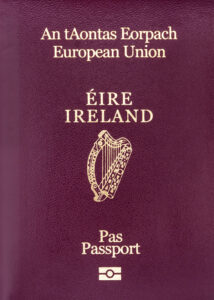 I have Irish ancestry; in fact, since my grandfather was born in Ireland, I am eligible for Irish citizenship. I looked at what is involved some years ago and said why would I do that at my age? I am Australian; I do not need a dual nationality, irrespective of what ephemeral advantages that might bring, such as the national anthem. The Irish national anthem is one forged by fire in 1911; Australia’s doggerel was composed for a concert of the Highland Society of New South Wales in 1878.
I have Irish ancestry; in fact, since my grandfather was born in Ireland, I am eligible for Irish citizenship. I looked at what is involved some years ago and said why would I do that at my age? I am Australian; I do not need a dual nationality, irrespective of what ephemeral advantages that might bring, such as the national anthem. The Irish national anthem is one forged by fire in 1911; Australia’s doggerel was composed for a concert of the Highland Society of New South Wales in 1878.
I have been registered to practise medicine in the Republic for years and like all good unionists joined the Irish Medical Organisation and even attended some of their conferences. I am shedding membership in Irish organisations of which I am a member. I have done courses in Irish, both contemporary and Old – and nothing has stuck. Except I can pronounce Niamh and Saiose.
Thus, what is left to us is acknowledgement of St Patrick’s Day. Gone are the days of faux leprechauns decked out in four-leaf clover (I was reminded this week that the world record for a stalk of clover is 56 leaves). However, blarney is what those blessed with Irish genes are contained in each Bushmill drop.
Why is it that on one day of the year Irish whiskey becomes palatable, but that is a trifle harsh, especially when it is 10 years’ old malt. The Irish drink Guinness; the elderly elsewhere call it stout. To me they are equally to be avoided. I dislike the creaminess, which spills over to many of the other Irish beers. Yet after the first two pints, it does become more tolerable.
Now Irish cuisine is another matter. It has the breadth of experience of a mashed potato abetted by cuts of meat, including mince, a step up from offal – some of which incidentally I like, as long as it is not brains, heart, lungs or sweetbreads.
In any event, we sat down to a meal of shepherd’s pie with red cabbage and apples. We did have enough potato not to add colcannon and enough cabbage not to need corned beef – other staples of Irish cuisine! Potato bread was piled up on a separate plate.
As it coincided with my Portuguese language class, I offered a toast to the class with green coloured water. You see, the Portuguese have a variety of wine which they called vinho verde. Actually, it is not green, it is straw-coloured. In fact, it is a white wine from that eponymous region of Portugal along the River Douro. I don’t think my teacher got the joke.
My celebration of my Irish heritage thus is reduced to an annual meal of modest proportions and a certain latter-day sparseness in my quaffing.
I am not one for Bloomsday, although at one of those pub celebrations, I once saw across the bar somebody who in profile uncannily resembled Katherine Mansfield. She is one of several women in history who have always fascinated me and whom I wished that I could have met.
I have shivered in the Celtic Twilight and stood in homage of William Butler Yeats and his wife, George, at their grave in Drumcliff Co Sligo. As the Irish Times reported at his final interment in 1948, he having died in France in early 1939 and his remains transferred after WWII to Ireland.
THERE WAS a veil of mist over the bare head of Ben Bulben yesterday afternoon when the remains of William Butler Yeats were buried in Irish soil. Soft grey rain swept in from the sea, soaking the Irish tricolour that lay upon the plain wooden coffin, as the body of the poet was laid at last in the churchyard of Drumcliffe.
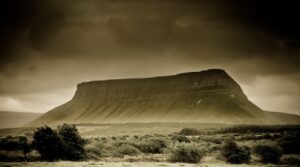
But strangest of all my experiences in the Emerald Isle was the day I was striding across the Burren in Co Clare and I began to run because it had started to rain. I then had the strongest feeling I have ever had of déjà vu. A small boy also running, a boy in shreds and patches. No, I’m not completely mad; just Irish.
Let me fish off Cape St Mary’s
It is just a matter of my association of St Patrick’s day and the Western Australian election. It is tortuous but let me explain.
Western Australia has just witnessed the biggest rejection of being an Australian that one could ever imagine. I immediately thought of the landslide elections which have taken place in Queensland in 1974 and then in 2012. It was a matter of personalities, and if Queenslanders take a set against you then it’s “good night nurse”, as multiple “Mexicans” have found out.
However, the genesis of the Western Australian terramoto is different. The population has embraced secession with an unbridled intensity.
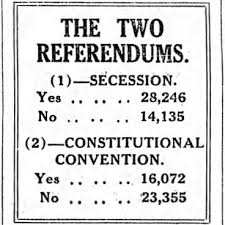
While the victory may partially be attributed to the current strength of the Western Australian economy, with the iron ore prices being high and Brazil being a “basket case”, the root cause lies in secessionist sentiments. Premier McGowan has been able to pull off what his State tried to do by legislative changes in the 1930s. He has seceded from the rest of Australia by just closing the borders when the Virus appeared, continuing it well after it was justified on public health reasons, thus thumbing his nose at the Prime Minister. His course of action was endorsed by the Liberal Party wipeout at the recent election.
Yet if there was one incident that set McGowan off, it was the Ruby Princess affair. He was incensed by the NSW Government’s cavalier handling of that incident, and he has used Premier Berejiklian as a punching bag ever since when it has suited him. Berejiklian seems to evoke this visceral response from other Premiers. They see through her “goodie-two-shoes teacher’s pet” persona.
The border issue made some sense when Australia was working out the adversary Virus and NSW was allowing the Virus to rip through Australia via the Ruby Princess debacle. Then progressively as Australia worked out a uniform public health response, it made less and less sense in any public health interpretation and more to political animosities to keep the borders closed. The pain in developing this uniform strategy should not be underestimated nevertheless.
Border closure became an overt political device by the less populous States, none better manipulated than by McGowan.
It is interesting to note that during the 1890s the group that pushed Western Australia towards Federation were Eastern Goldfield miners around Kalgoorlie. Given that gold had not been discovered until a few years before, it showed how quickly a mining group could gain an influential position. Western Australia then had a small population located in a huge land mass, where cattle occupied grass castles; grain was been grown in fertile south-west; whaling was concentrated around Albany; a pearling industry had been started around Broome; and for a time, sandalwood was the major export.
Some voices suggested that New Zealand would be more relevant within the nascent Federation, but in the end by 1901, Western Australia had joined but New Zealand had declined.
Nevertheless, secessionism always close to the surface. If the Federal Government had paid heed to the history of the Western Australian secessionist movements, it would have recognised the dangerous course McGowan has pursued. It is extremely difficult now to achieve actual secession constitutionally, as the path to this was effectively closed during the 1930s. The border closure issue remains and will persist as long as the Federal Government fails to confront the situation.
Now why would I connect this secessionist movement with St Patrick’s Day?
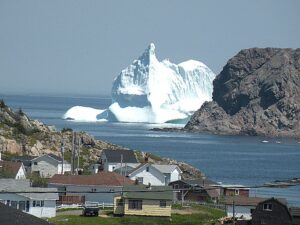
Whenever I think of the Irish, apart from my Australo-Irish heritage, I think of Newfoundland. When one goes to Newfoundland, one realises that Mother Nature is Irish. In the St John’s harbour on the first day of summer, there are icebergs still. Well, actually summer begins on 16 June when the trees have burst into foliage, and then there is a two-week moratorium before the mosquitos emerge, and the battle is joined.
The other factor in my memory was how Irish Newfoundland felt for me. The “Newfie” accent has more than a hint of the brogue, but it was the music which confirmed that Newfoundland was part of Irish diaspora. To hear the group, the Irish Descendants, singing Let me Fish Off Cape St Mary’s is to hear the heart of the diaspora. The cliffs from which this fishing port overlooks the Atlantic Ocean could be part of the West Coast of Ireland. It was ironic when I was there that fishing for cod, once the mainstay of the fishing industry, was prohibited so far had the fish stocks fallen. The ban came in 1992, and it was 20 years before the cod returned in numbers. One could still get cod’s tongue, a local delicacy but then it came from “aways”. I think somebody might have said Iceland.
And what the hell has this to do with Western Australia? Well, Newfoundland had been created a separate dominion apart from Canada in 1907. In effect it was a separate country. At the same time in 1934, while certain elements in Western Australia were agitating for secession, the Newfoundlanders were doing the opposite. The Great Depression had sent them perilously close to the financial wall, and so they joined the Canadian Federation giving up their self-governing status and adding Mainland Labrador to form the present province. The fact that Newfoundland is much the same distance to Dublin as to Ottawa did not influence the “Newfie” intent, but then it is not in their makeup to calibrate distance as a sign of loyalty.
Both in Australia and Canada shift in status has depended on constitutional recognition. In the past when there are concerns of disease spread, the methods of quarantine including border closure are constitutionally the responsibility of the Federal Government. Setting up a public relations manoeuvre and calling it a “national cabinet” in the end showed that the Federal Government was just shifting its constitutional responsibility to the States so they could cop the blame if matters went wrong as they did in Victoria.
McGowan is in the favourable position of being able to have the same advantageous GST position, as heading a State of the Commonwealth of Australia.
However, he is perceived as having had a landslide electoral victory when he shook the secessionist tambourine for all its worth, Western Australia the de facto nation holding as hostages many of the electoral Federal foes including the controversial duo of Porter and Reynolds. Moreover, Western Australia in all likelihood will lose one of the seats in coming redistribution, and therefore the already nervous Liberal Party will be forced to play “musical seats”. Thus, an already factionalised Liberal Party has all the ingredients to tear itself apart
McGowan now knows that if the Federal Government holds back GST money from Western Australia or take any other perceived discriminatory action, it will be beaten up electorally there.
McGowan knows that the Federal Government is not willing to stop him meddling with the borders. He does not need any constitutional change to effect secession without metaphorically “leaving the building”. He has effectively done so, and any arcane legal processes were brushed aside when he effectively usurped the quarantine power of the Commonwealth, which unequivocally is a constitutional power of the Federal Government.
Therefore, the Prime Minister is faced with this situation, first enunciated by Bishop Morton, of Morton’s fork.
Ironically, one of the Prime Minister’s strongest acolytes is named Morton, a Pentecostal blow-in from NSW who was in charge of the WA Liberal Party, who inherited Tangney, a very safe Liberal seat along the Swan River. No longer if the recent State election is any guide.
What happened in the 1930s was because the Federal Government of both Australia and Canada held the cards. The constitutional barriers were too great in Australia once the deed had been done in 1901; and Newfoundland simply could not afford being a separate nation.
But as they say in the native argot, McGowan is “giving it a red hot go” to create his own nation.
Oh, not another transparent bureaucrat
“At ASIO, we’re conscious that the names and labels we use are important,” he said. “Words matter. They can be very powerful in how they frame an issue and how they make people think about issue.”
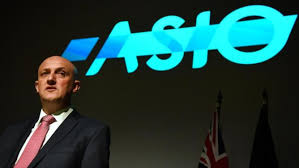
Thus, spake Mr Burgess, the head of the Australian academy of spooks. He is “friendly” Mike to us punters. In a recent media interview, we get the full story of the poor boy from a migrant family who was the first in his family to go the University and moreover to undertake electrical engineering. Before the image of the “log cabin” childhood is further invoked, he outs himself as being a cyber nut, and thus he lives in a world where his simulacra in other jurisdictions try to out-hack one another.
Nevertheless, there is a cloaked anecdote about the “nest of spies” that his outfit has been able to quash or whatever – there is no detail; just an enticing tit-bit for the writer. Spooks must invoke mystery and plot right back to Walsingham.
One of the most concerning situations is when somebody in the spook business embarks on this sort of exercise, because those who run the organisation can try and present themselves as an ordinary person, you know the football team follower, has a dog et cetera and that – at the same time at budget time invokes all sorts of horror befalling the nation if the “Spook Budget” is not increased.
The security services exist to keep their rival services at bay, foiling disablers of major computer networks, and preventing such anti-community activities such as the recent Neo-Nazi gathering at Hall’s Gap.
The essential ingredient is to have a critical evaluation of the effectiveness of such activities. Burgess in the comments quoted above also maintains that no longer will they reveal whether the dangers are from the extremist right or left wing groups or delineating whether the terrorist groups are linked to ISIS or whatever. He said that his service will restrict itself to saying that such activities will be characterised as being “belief or ideologically based”. It is subtle, but in fact he is saying he will be further constricting information, but generalising the threat.
I wonder, as I pass through the airport screening how useful testing for explosives has been, because some mad guy tried to detonate explosives in the heels of his shoes on a Miami bound flight in 2001. How many copycats have been detected at Australian airports, at what cost, given also that there is a large group that is not tested anyway?
The January episode in Washington showed how useful security is when a crowd is determined to riot to the point of insurrection. Mostly not at all.
I want to be assured that our security services don’t spend their money on profiling their operatives. I would like to believe that given the Australian security service has a history of conservative political association, this has dissipated and been replaced by a politically neutral service. Parliamentary surveillance needs to include people able to contain the secretive authoritarian technocrat that Burgess embodies.
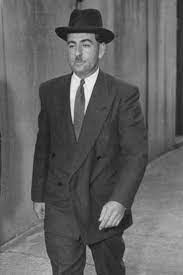
Attempts were made to recruit me when ASIO, under Brigadier Spry, was a political action committee for the Menzies Government concerned with “reds under the bed”; and riddled with proto-fascist operatives such as elements of Moral Re-Armament, the leader of which Frank Buchman openly praised Hitler.
Charles Spry himself was an affable chap, with a penchant for Scotch whisky which he shared with the Prime Minister. However, behind that persona was a very determined anti-communist and where scruples could be left on the dressing table as if they were cuff links.
Whitlam set up the Hope Royal Commission in 1974, the report from which has formed the basis for the modern-day intelligence services. A raid on ASIO as ordered by Lionel Murphy, then the Commonwealth Attorney-General in 1973, would today be unimaginable.
In a very perceptive thesis on the organisation published in 2018, Coventry concluded:
Intelligence and security have become second nature to Australians and anyone else in the US ‘hub and spokes’ system. To argue for the abolition of ASIO in the present time is unpalatable; for good reason. The neoliberal phenomenon of globalisation means that targets of terrorism are, as Nixon feared, ubiquitous. Any citizen or corporation or NGO located overseas can be seen as an extension of a targeted government; all it takes is a careless comment by a public official. It is often overlooked that governments have a clear role in provoking terrorism, including within in society, though many may wish to believe this threat comes purely from the mental illness, barbarity and jealousy of others.
In 2010, the former director general of MI5, Eliza Manningham-Buller, told the Chilcot Inquiry that she had warned the Blair Government (1997-2007) that involvement in the Iraq War would result in higher levels of home-grown terrorism. She was of course vindicated. It must be said that ASIO has done well so far to keep the Australian Government and citizenry from the kind of harm exhibited overseas.
That last comment is reassuring, but that was written before Burgess became the ASIO Director-General in 2019, and he is running the line of foreign interference and espionage being the paramount dangers (rather than terrorism) which suits his technologically-driven agenda. He reminds me of the old “cold war warriors”, himself ideologically driven as far as his background has given meaning to that word (or words).
Australia needs an Attorney-General to withstand Burgess’ undoubtedly very powerful personality coupled with his wide access to information. To believe that Australia’s security organisation does not actively participate in cyber warfare would be incredibly naïve.
I am now an avid watcher of the activities of Mike Burgess. I look forward to his first interview with Crikey.
Mouse Whisper
I never did like that skunk Pepe Le Pew. His characterisation gave rodents a bad name, but he is the latest casualty in the war against the predatory male. Looney Tunes have shown him the door. The comedian, David Chappelle, who once said that the famous can always become infamous but not unfamous, says of the skunk: Pepe, whom he laughed at as a kid, later through an adult lens makes him realise: “What kind of … rapist is this guy?”
Wait a minute! I stand corrected. Skunks are not rodents; they are of the same ilk as Tim Wilson’s cabal of wolverines.

